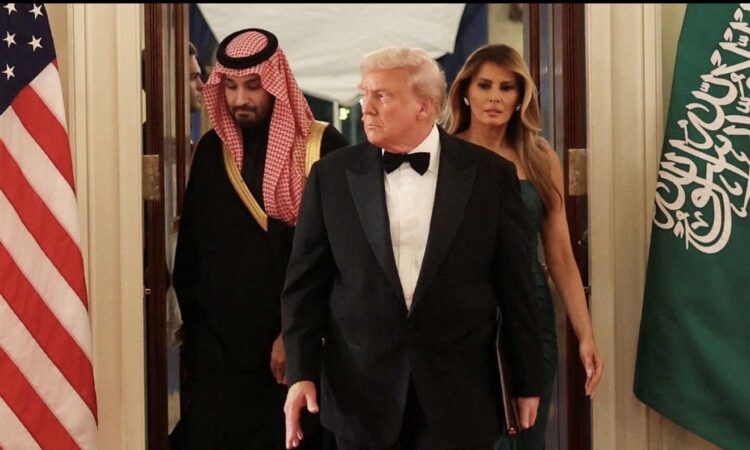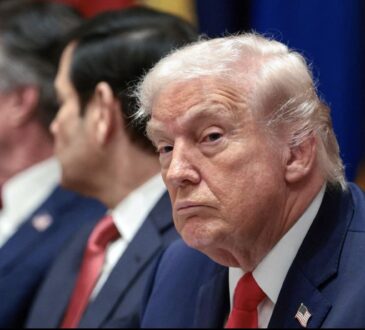
When Saudi Crown Prince Mohammed bin Salman, known as MBS, arrived at the White House, he was welcomed like a king. A Marine band was playing, officers on horseback carried both the Saudi and American flags, and fighter jets flew over the White House in a V shape. It was a dramatic and very public show of respect that most foreign leaders never receive when they visit.
So what had MBS done to deserve such a grand welcome from the United States? On paper, people might say he helped broker a possible peace deal between Hamas and Israel. But other countries like Egypt, Qatar, Jordan, and the United Arab Emirates have also been involved in those talks, and none of their leaders got this kind of treatment in Washington.
The real reason seems to be money and business. MBS and the Saudi government have been doing a lot of financial deals with Donald Trump’s family, and this visit looks like part of that payoff. It is also clearly an attempt by MBS to improve his image in the eyes of the world after the brutal killing of Washington Post columnist Jamal Khashoggi. Khashoggi was murdered by Saudi agents, and his body was cut into pieces with a bone saw. U.S. intelligence concluded that MBS himself approved the operation.
Despite this, during their joint appearance in the Oval Office, Trump and MBS exchanged warm praise and smiles. When a reporter asked about MBS’s role in Khashoggi’s murder, Trump brushed off the question. He said, “A lot of people didn’t like that gentleman that you’re talking about, whether you like him or didn’t like him, things happen,” referring to Khashoggi as if his killing were just some unfortunate event.
“Things happen”? A journalist was murdered and dismembered, and it was treated like an accident or a minor incident.
When the reporter then tried to ask MBS about the U.S. intelligence finding that he approved the killing, Trump quickly cut in and defended him: “He knew nothing about it. You don’t have to embarrass our guest by asking something like that.” Instead of pressing for accountability, Trump protected MBS from tough questions and treated him as an honored guest.
This raises a bigger question: in this Trump era, who gets honored and who gets shamed? Who faces consequences, and who gets their reputation polished?
Take Larry Summers as an example. Summers served as Treasury Secretary under Bill Clinton and held a top position in the Obama White House. Recently, he said he was “deeply ashamed” of his connection to Jeffrey Epstein, the convicted sex offender, and announced that he would be “stepping back” from public life to “rebuild trust and repair relationships.”
New details about Summers’s relationship with Epstein came out when a House committee released emails between them. These emails showed years of contact, including sexist remarks from Summers and moments where he even asked Epstein for romantic advice. After these revelations, Summers did what crisis consultants often recommend: issue a public apology and step away from the spotlight for a while.
But the real test of whether someone is truly sorry is whether they actually give up something meaningful. So far, it does not look like Summers is losing very much. He is still a University Professor at Harvard, which is the top rank a professor can hold there. Senator Elizabeth Warren has said Harvard should cut ties with him if they really want to hold him accountable for his close friendship with Epstein. For now, it seems like his “step back” is more symbolic than real sacrifice.
Questions about honor, shame, and real remorse also apply to New York City Mayor Eric Adams. In his final weeks in office, he has increased his foreign travel, with the city paying for much of it. This is happening even though he has been indicted on corruption charges that partly involve improper foreign trips. Yet there is no sign of humility or regret from him. Instead of acting like someone facing serious allegations, he continues to travel and enjoy the benefits of office.
Then there is Elon Musk. Despite a long list of serious issues — including court rulings that say his actions broke the law and a big public fallout with Trump — he is still being treated like a star. He is set to host a festive DOGE-themed reunion in Austin at a luxury hotel where he often keeps a suite. In other words, even after aggressive and sometimes harmful behavior, he is still celebrated and welcomed in elite spaces.
All of this adds up to a troubling picture. In the age of Trump, America’s sense of moral leadership seems to have faded. The idea that the country tries to stand for what is right, or at least make an effort to do so, looks weaker than ever. The usual norms and standards that used to guide who we celebrate and who we condemn are breaking down.
Under Trump, the main rule appears to be simple: get as much money and power as you can. Those who have wealth and influence are praised and embraced, even if they have been connected to murder, corruption, or abuse. A crown prince linked to a brutal killing gets a hero’s welcome. A billionaire who breaks rules still gets a luxury event. A mayor under indictment keeps taking trips. A powerful academic with deep ties to a sex offender stays in his prestigious position.
The only real line that still seems to matter is around pedophilia, or being too close to someone involved in it. Even then, if the person gives a serious-sounding apology and shows some public “contrition,” there is often a path back to respectability. The door to honor never fully closes as long as someone has status and connections.
When this dark period of moral confusion and hypocrisy finally ends, one of America’s biggest tasks will be to rebuild a real sense of honor and shame. That means deciding clearly who deserves public respect, who should face lasting consequences, and what true accountability looks like. It also means recognizing that genuine remorse requires real sacrifice, not just carefully crafted statements.
Robert Reich, who wrote these reflections, is a professor of public policy at the University of California, Berkeley, and a former U.S. Secretary of Labor. He shares more of his work on his Substack page and has a memoir titled Coming Up Short, which is available through major booksellers and local bookstores.




